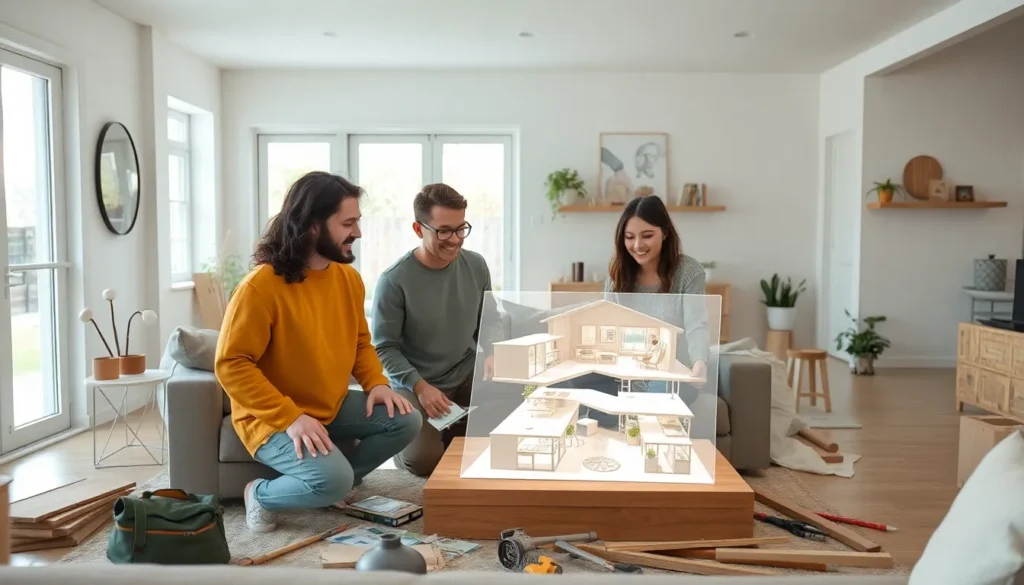Imagine transforming your home without lifting a single paintbrush or breaking a sweat. Sounds like magic, right? Well, with home renovation AI, it’s not just a dream—it’s a reality. This innovative technology is revolutionizing the way homeowners approach renovations, making it easier and more efficient than ever before.
Home Renovation AI
Home renovation AI simplifies the planning and design process, offering tools that analyze space and provide design suggestions. This technology allows users to visualize changes before execution, saving time and resources.
3D visualization software enables homeowners to see potential outcomes in real-time. Many applications use augmented reality to overlay designs onto existing spaces, giving a clear view of transformations.
Home renovation AI also generates estimates for material costs, helping individuals budget effectively. By leveraging large datasets, this technology can recommend eco-friendly materials and energy-efficient options, aligning with sustainability goals.
Smart home integration is another facet of this innovation. Automation assists with lighting, heating, and security, creating a comprehensive approach to home improvement.
User-friendly interfaces make the technology accessible, regardless of technical expertise. Homeowners can experiment with layouts and color schemes effortlessly, encouraging creativity in redesign.
Over time, machine learning algorithms improve recommendations based on previous projects and user feedback. Adaptability ensures that AI evolves to meet changing homeowner needs, making renovations more personalized and efficient.
Home renovation AI streamlines the design process, enhances visualization, assists with budgeting, and promotes sustainability, making it a valuable tool for modern homeowners.
Benefits of Using Home Renovation AI

Home renovation AI provides a range of advantages, transforming how individuals approach their projects. This technology enhances design and contributes significantly to efficiency.
Improved Design Accuracy
AI tools assess spatial dimensions and generate precise design suggestions. Personalized recommendations emerge from analyzing user preferences and existing structures. Visualization features, such as 3D models, help homeowners comprehend layout changes before implementation. Accurate measurements reduce costly mistakes, ensuring optimal material usage. Furthermore, suggestions for compatible colors and styles enhance aesthetic appeal. Homeowners also benefit from AI systems that adapt based on feedback, continually refining design suggestions.
Cost and Time Efficiency
Home renovation AI streamlines project timelines, simplifying complex planning stages. Immediate estimates for materials and labor costs facilitate effective budgeting, preventing unexpected expenses. By automating repetitive tasks, such as drafting plans, homeowners save valuable time. Quick access to design options allows for faster decision-making. Additionally, AI promotes environmentally friendly practices by suggesting energy-efficient materials and layouts, which often result in lower operating costs. Overall, this technology fosters timely project completion while controlling expenses effectively.
Popular Home Renovation AI Tools
Home renovation AI tools provide innovative solutions for effective remodeling. These tools enhance design accuracy and improve project efficiency.
Tool Comparison
Various home renovation AI tools exist, each offering unique features. Software such as SketchUp enables detailed 3D modeling, while Houzz focuses on user-friendly interfaces and extensive design inspiration. Planner 5D stands out with its drag-and-drop capabilities, making it accessible for beginners. For augmented reality experiences, applications like MagicPlan provide real-time visualizations. Tools such as Home Designer Suite integrate with smart home systems, allowing seamless adjustments. Evaluating these options helps homeowners choose the right tool to suit their specific renovation needs.
User Experiences
User feedback showcases the effectiveness of home renovation AI tools. Many homeowners appreciate the visualization capabilities, noting that 3D models help them envision their projects clearly. Satisfaction often stems from the time-saving features, enabling quicker planning than traditional methods. They mention improved accuracy in design choices and layout effectiveness, reducing costly post-implementation changes. Positive experiences highlight ease of use, with many users describing the interfaces as intuitive. Homeowners also report enhanced creativity when experimenting with various styles and materials, resulting in unique personalized spaces.
Challenges and Considerations
Home renovation AI offers immense potential, yet it also presents several challenges and considerations that homeowners should navigate carefully.
Limitations of AI in Renovation
AI in renovation faces constraints in context understanding, leading to potential misinterpretations of user preferences. Certain nuances in design preferences may elude AI analysis. Complex projects often require human intuition and creativity, which AI cannot replicate fully. Additionally, dependency on software means technical issues can interrupt workflow. Cost estimates generated by AI may not always account for on-site challenges, resulting in budget overruns. Data privacy concerns arise when users share personal information with AI-driven platforms. These limitations can impact the overall effectiveness of home renovation AI tools.
Ethical Considerations
Implementing home renovation AI raises ethical issues linked to data use and privacy. Homeowners often submit photos and personal details to software, creating a risk of data breaches. Transparency about how AI processes personal information is essential. Moreover, biases in AI algorithms can lead to unequal design options, potentially excluding certain styles or materials that some demographics might prefer. The influence of AI on creativity and decision-making raises questions of ownership over designs generated through these tools. Stakeholders must prioritize ethical AI use to foster trust and inclusivity in home renovation.
Future Trends in Home Renovation AI
Emerging trends in home renovation AI focus on enhancing user experience and efficiency. Integration of virtual reality allows homeowners to immerse themselves in their designs, fostering real-time decision-making. Advanced algorithms analyze a wide array of data, predicting design preferences based on regional trends and individual tastes.
Customization capabilities are expanding with AI systems offering tailored suggestions based on user interactions. Enhanced machine learning models learn from previous projects, refining their recommendations and producing more relevant outcomes. Predictive analytics highlights potential future design trends, aiding homeowners in making informed choices.
Sustainable practices remain a priority. AI tools now assess the environmental impact of renovations, recommending greener materials and practices to reduce waste. Comprehensive material databases enable users to identify energy-efficient options that align with their renovation goals.
Collaborative platforms are gaining traction, allowing multiple users to interact within one project. Homeowners, contractors, and designers can work together seamlessly, sharing ideas and making adjustments in real-time. Integration with smart home technology remains a significant trend. Automation of systems like lighting and HVAC enhances daily living, providing homeowners with added comfort and efficiency.
Cost estimation tools are becoming more accurate. AI-generated estimates now incorporate variables that reflect on-site realities, minimizing budget overruns. Greater emphasis on data privacy is evident as companies prioritize user trust and implement robust security measures.
Ultimately, these trends signify a shift toward smarter, more user-centric home renovation solutions. With continuous advancements, homeowners can expect a more intuitive, efficient, and sustainable renovation experience.
Conclusion
Home renovation AI is revolutionizing how homeowners approach their projects. By simplifying planning and design processes it empowers individuals to create personalized spaces efficiently. The integration of advanced visualization tools and smart technology enhances creativity while ensuring accuracy in design choices.
As this technology evolves it addresses challenges like data privacy and context understanding. Emerging trends highlight a focus on user experience collaboration and sustainability. With AI continually adapting to user needs the future of home renovation promises to be smarter and more intuitive.
Embracing home renovation AI not only streamlines the renovation journey but also fosters innovative practices that benefit both homeowners and the environment.

